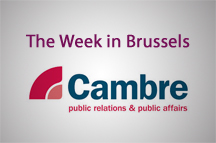 The last few weeks have seen Brussels transfixed by Commissioner hearings, with casualties (Alenka Bratusek), close shaves (Lord Jonathan Hill) and champions (Frans Timmermans). Perhaps more revealing than the individual assessment of candidate Commissioners is the scrutiny that was given to the role of Commission Vice Presidents and indirectly to Jean-Claude Juncker’s proposed new structure for the Commission.
The last few weeks have seen Brussels transfixed by Commissioner hearings, with casualties (Alenka Bratusek), close shaves (Lord Jonathan Hill) and champions (Frans Timmermans). Perhaps more revealing than the individual assessment of candidate Commissioners is the scrutiny that was given to the role of Commission Vice Presidents and indirectly to Jean-Claude Juncker’s proposed new structure for the Commission.
The new structure and the introduction of a Commissioner for Better Regulation underscore a key Juncker objective: reduce the amount of legislative proposals coming out of the Commission. This raises fundamental questions about the role of the Commission, whose main power within the EU system has lain in its exclusive right to initiate legislation. The indications are, however, that the new Commission is likely to focus more on the second main role of the Executive: supporting implementation through comitology and soft policy guidance. This shift away from initiating legislation will have a significant effect on the role of the other institutions. In particular, it will be to the detriment of the European Parliament, whose primary influence rests in its role as co-legislator.
As such, it is little wonder that through the hearings the Parliament has registered its concern about the proposed Vice-Presidential structure which – on the surface at least – appears to wrestle back some of the power gained by the Parliament with the adoption of the Lisbon Treaty. And just as the last EP elections confirmed that the EU is more of a political animal than ever, the Parliament’s own Spitzenkandidat is threatening to clip its wings.
 The new structure is of course not only relevant to the Parliament; public affairs professionals (such as businesses, NGOs, consultants) should be reflecting not only on the impact the governance changes may have on the issues they deal with, but also the implications the shift has for the way they operate and the services they provide at EU level.
The new structure is of course not only relevant to the Parliament; public affairs professionals (such as businesses, NGOs, consultants) should be reflecting not only on the impact the governance changes may have on the issues they deal with, but also the implications the shift has for the way they operate and the services they provide at EU level.
The apparent business-friendly agenda of the new Commission will be welcome, but if a reduction in Commission proposals is true, the volume of dossiers passing through ordinary legislative procedure and all the work associated with it will be reduced in turn, which could in theory result in lobbyists having time on their hands.
This is, however, far from certain.
The Juncker Commission is born from a politicization of the EU. Politicization means responding to popular demand, and this can work in both ways. While Member States and European citizens may be eager to claw back competences in some areas, there is still recognition of the need for more EU involvement in key policy areas if Europe is to maintain and reinforce its position on the global stage. This selectivity will require stakeholders to see the bigger picture and jockey for position to establish the relevance of their sector, interest or vision.
Politicization also implies new roles for public affairs professionals. Having the right networks, having one’s finger on the political pulse and being able to present the right arguments, to the right people, through the right channels and at the right time will be more important than ever. The ever-growing ability to mobilize constituencies across Europe provides new opportunities, while creating a need for broader effective communication and conscientious listening.
And yet, as the expression goes: “the more things change, the more they stay the same”. A more political EU might mean in the short run less legislative procedure, but the new impetus behind implementation, enforcement, and technical adaptation will create a need for more detailed technical advocacy. The days of the “EU nerds” are not over just yet.














